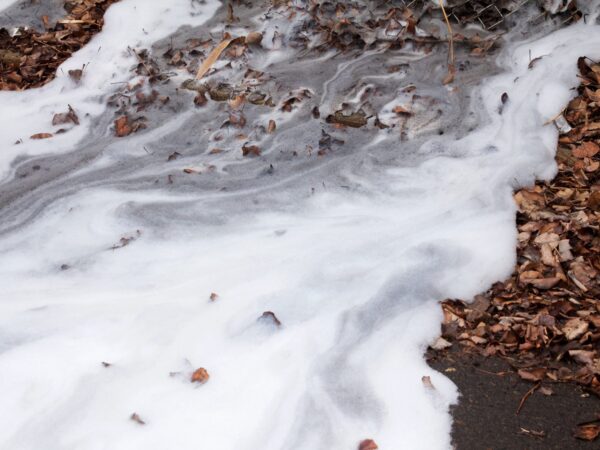
By Kelly House, Bridge Michigan
The Great Lakes News Collaborative includes Bridge Michigan; Circle of Blue; Great Lakes Now at Detroit Public Television; and Michigan Radio, Michigan’s NPR News Leader; who work together to bring audiences news and information about the impact of climate change, pollution, and aging infrastructure on the Great Lakes and drinking water. This independent journalism is supported by the Charles Stewart Mott Foundation. Find all the work HERE.
- Two Republican lawmakers want to require septic inspections when homes are sold
- Lack of statewide regulations leaves local governments in charge of septic pollution fixes
- On Higgins Lake, a dispute over septic pollution is fueling efforts to oust local officials
After earlier efforts failed to address septic pollution in Michigan, Rep. Jeff Yaroch is hoping for better luck with a narrower approach.
Taking a cue from local health officials in his home county of Macomb, Yaroch, R-Richmond, wants Michigan to require inspections of household septic systems when a home is sold or transferred, a move he said would give homebuyers an opportunity to negotiate over required fixes while keeping human waste out of Michigan’s lakes and rivers.
“The most protective person of their private property rights expects that there is going to be a review of their property before they sell it,” Yaroch told the Michigan House Natural Resources and Outdoor Recreation Committee on Wednesday in the first hearing on the bill, co-sponsored by Daire Rendon, R-Lake City.
It’s the latest attempt at septic regulation reforms that have repeatedly floundered in the legislature, amid mounting evidence that septic pollution is imperiling the state’s waters. But like past attempts, it faces headwinds.
Michigan is the only state without a uniform sanitary code, leaving local officials largely responsible for deciding how to curb pollution from 1.4 million, often old and leaky septic systems across the state. In some communities, it’s fueling intense political fights.
On Higgins Lake in Roscommon County, where the leaders of two lakeside townships want to install a $115 million sewer system to alleviate septic pollution, the November election has turned into a referendum on the area’s controversial sewer plan. Four of five township board members in Lyon Township face recall elections over their support for replacing septic systems with sewers.
Similar controversies are playing out on the shores of heavily-developed lakes throughout the state, as septic pollution problems fester. State officials estimate up to one-in-five of Michigan’s 1.4 million septic systems could be failing, sending water tainted with bacteria, viruses and nutrients into neighboring waterways.
“The more septic tanks we have, the more there (are) human sewage markers in our surface waters,” said Joan Rose, a Michigan State University microbiologist and expert on septic pollution issues whose research revealed high levels of human fecal bacteria in waterways near lots of septic systems.
Previous reforms never gained traction
The 21st Century Infrastructure Commission, a state group appointed by then-Gov. Rick Snyder, called for new regulations, an embrace of sewers where warranted, and state spending of about $20 million annually to help people with “demonstrated financial need” fix their septics.
A May infrastructure spending deal between legislators and Gov. Gretchen Whitmer put $35 million into a loan program to help homeowners fix failing septics. But a series of attempted regulatory reforms, from requiring periodic septic inspections to creating a statewide sanitary code, have failed to gain traction in recent years.
Yaroch’s latest effort to address septic pollution faces opposition from the Michigan Association of Realtors, whose leaders say the bill would have a chilling effect on home sales while sowing confusion between state and local regulators.
“Local health departments all have rules for inspection and the required maintenance of a working septic system,” association lawyer Brian Westrin wrote in testimony submitted to the committee. “Why not enforce them instead of creating new laws to do the same thing with another level of government?”
Under the bill, failing septic systems would need to be fixed before a sale could proceed. But Brad Ward, vice president of public policy and legal affairs for the Realtors association, said the bill lacks clarity about what inspections should entail, and what constitutes a failure.
Norm Hess, executive director of the Michigan Association for Local Public Health, which represents the state’s 45 local public health offices, said the group is open to a statewide regulatory approach, “but it comes down to, somebody has to fund it at a reasonable level.”
The bill calls for septic evaluators to pay a state registration fee that could help offset the costs of running the inspection program, but doesn’t offer further specifics about funding.
Yaroch’s bill, Hess said, contains too few specifics to get the group’s support but could tee up further talk of septic regulations in the next legislative session. The state department of Environment, Great Lakes and Energy has signaled conceptual support for the bill, and an agency spokesperson said EGLE is working with Yaroch to clarify some provisions.
The bill represents “an important step in establishing a minimum statewide standard on oversight of septic systems in Michigan,” EGLE spokesperson Hugh McDiarmid said.
Neighbor against neighbor
In the meantime, conflicts over septic policy are erupting locally.
On Higgins Lake, multiple studies have warned that nutrient pollution from thousands of home septic systems is fouling the popular lake and tainting nearby drinking water wells. But opponents to the proposed sewer, known as a STEP system, argue it’s not the right solution and worry about the cost.
“It’s clear that this community does not want this proposed STEP system in its current format,” said Dave Hobson, leader of the anti-sewer group, Higgins Lake United.
Hobson said his group aims to replace the board with “leadership that will represent all constituents,” including those who oppose the proposed sewer.
Some fear high project costs will overwhelm low-income residents. Others are skeptical of the type of sewer being proposed, or fearful the project will worsen the already-stark divide between wealthy lakefront residents and those who live in more modest backlot homes. Still others say they’re unconvinced septic systems are behind the lake’s problems.
Officials in Lyon and neighboring Gerrish Township hope to get grants to cover some or all of the $115 million sewer project, charging property owners for remaining costs through a special assessment district.
But blowback from sewer opponents has scuttled that plan, at least temporarily, by triggering a provision of state law that requires Lyon Township officials to get written support from landowners representing a majority of the proposed sewer district’s landmass before they can proceed.
Township officials say they’re working to win over sewer skeptics. They vowed that they will not build the sewer without significant outside funding. And they’re researching fee structures that would require lakefront property owners to pay more than their backlot neighbors, in recognition that lakefront property values will rise higher if sewers are installed.
But if Lyon Township voters oust public officials who support the sewer this November, Township Supervisor Julie Tatro said, “you can pretty much consider the sewer project dead.”
Anticipating that possibility, Gerrish and Lyon Township have begun crafting an ordinance to crack down on leaky septics.
Fixing septics could ultimately cost residents more money than the proposed sewers: The Central Michigan District Health Department estimates 40 percent of Higgins Lake homeowners haven’t updated their septic system in more than 50 years, meaning they are almost certainly failing. Replacing a single faulty septic can cost well upwards of $10,000.
Gerrish Township Supervisor David Udy expressed frustration that Michigan’s hands-off approach to septic pollution has foisted the problem onto local governments. But he predicted Yaroch’s proposed inspection program would be of limited help on Up North recreational lakes, where family cottages are often passed down through generations without ever being sold.
“It’s not just Higgins Lake,” he said. “It’s Houghton Lake, it’s Lake Charlevoix. Any lake you go to, the biggest problem on these lakes is too many homes using septic tanks.”
The House Natural Resources Committee is expected to continue deliberating on the septic inspection bill at its next meeting.
Catch more news at Great Lakes Now:
State cracks down on Flint company after Flint River spill
Featured image: Nearly every member of the township board in Lyon Township, on the shores of Higgins Lake, faces a recall election this fall as the lake’s septic pollution problems fuel intense political fights. Michigan is the only state without a uniform sanitary code. (Bridge photo by Kelly House)
1 Comment
-
as a septic pumper licensed in both MI and WI. Been watching this happen over in WI. Lakes and rivers that have been historically over burdened with waste and nutrients are now becoming cleaner and more useable bodies of water. A statewide sanitary code is something we in MI need to get done. at the moment the hodge podge of regulations in the state have no teeth and as such we have an over abundance of surface discharge. until the state forces periotic inspections no one is going to fix anything.




